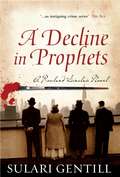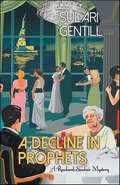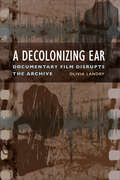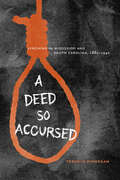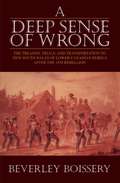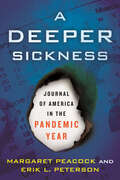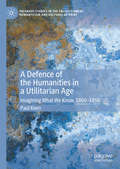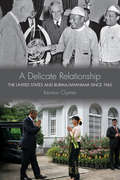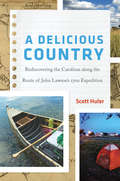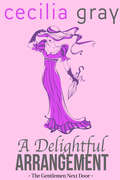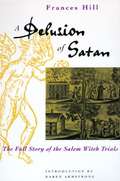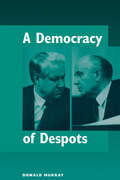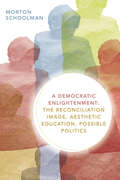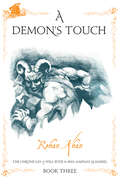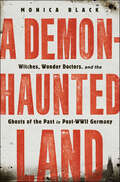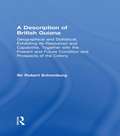- Table View
- List View
A Decline in Prophets (Rowland Sinclair #2)
by Sulari GentillA Rowland Sinclair Novel In 1932, the RMS Aquitania embodies all that is gracious and refined, in a world gripped by crisis and doubt. Returning home on the luxury liner after months abroad, Rowland Sinclair and his companions dine with a suffragette, a Bishop and a retired World Prophet. The Church encounters less orthodox religion in the Aquitania's chandeliered ballroom, where men of God rub shoulders with mystics in dinner suits. The elegant atmosphere on board is charged with tension but civility prevails... until people start to die. The things get a bit awkward. And Rowland finds himself unwittingly in the centre of it all. I'm afraid, Sinclair has a habit of being in the wrong place every possible time. I would think twice about standing next to him. God forbid, Rowland, you should return home without some sort of scandal... leading some kind of insane cult!
A Decline in Prophets (Rowland Sinclair WWII Mysteries #2)
by Sulari Gentill&“I thoroughly enjoyed the glamour of the ocean voyage . . . yet all the time, simmering beneath the surface, was . . . savage violence&” —Anne Perry, New York Times–bestselling author of the Daniel Pitt series Winner of the Davitt Award for Best Adult Novel Travel back in time to 1932 and book a first-class suite on the passenger liner RMS Aquitania, but take care, for among your fellow passengers is a ruthless killer. . . . Direct threats from Australia&’s warring Right and the Left having quieted, so wealthy Rowland Sinclair and his group of bohemian friends are their way home to Sydney via New York after a lengthy stay in Europe. The wealthy Sinclair scion has treated his artist friends to first-class accommodations on the Cunard ship, the luxury liner of the day. Also on board are some members of the Theosophical Society (a spiritualism movement), as well as an aggressively conservative Irish Catholic Bishop and his cohorts. Their clash ups the tensions in first class and presents the liner&’s captain with a tricky situation when bodies start to drop. It is Sinclair&’s bad luck that he becomes a suspect in the first death, that of the Bishop&’s beautiful young niece. But before the ship docks, he is cleared and the investigation, and further crimes, are taken ashore to the Australian capital and into some of its grand country houses—and of course, Rowly and his amateur sleuth friends follow. &“[Rowland Sinclair] is a little like a male Phryne Fisher . . . Gentill has a lot of fun with a hero who is always getting paint on his immaculate tailoring.&” —The Sydney Morning Herald &“A delightful period piece.&” ―Kirkus Reviews &“Gentill&’s lively second mystery featuring dashing Australian millionaire Rowland &‘Rowly&’ Sinclair . . . The witty and insightful glimpses of the Australian bourgeoisie of this period keep this mystery afloat.&” —Publishers Weekly
A Decolonizing Ear: Documentary Film Disrupts the Archive
by Olivia LandryThe recording of Indigenous voices is one of the most well-known methods of colonial ethnography. In A Decolonizing Ear, Olivia Landry offers a sceptical account of listening as a highly mediated and extractive act, influenced by technology and ideology. Returning to early ethnographic practices of voice recording and archiving at the turn of the twentieth century, with a particular focus on the German paradigm, she reveals the entanglement of listening in the logic of Euro-American empire and the ways in which contemporary films can destabilize the history of colonial sound reproduction. Landry provides close readings of several disparate documentary films from the late 1990s and the early 2000s. The book pays attention to technology and knowledge production to examine how these films employ recordings plucked from different colonial sound archives and disrupt their purposes. Drawing on film and documentary studies, sound studies, German studies, archival studies, postcolonial studies, and media history, A Decolonizing Ear develops a method of decolonizing listening from the insights provided by the films themselves.
A Deed So Accursed: Lynching in Mississippi and South Carolina, 1881–1940 (The American South Series)
by Terence FinneganFrom the end of Reconstruction to the onset of the civil rights era, lynching was prevalent in developing and frontier regions that had a dynamic and fluid African American population. Focusing on Mississippi and South Carolina because of the high proportion of African Americans in each state during "the age of lynching," Terence Finnegan explains lynching as a consequence of the revolution in social relations—assertiveness, competition, and tension—that resulted from emancipation. A comprehensive study of lynching in Mississippi and South Carolina, A Deed So Accursed reveals the economic and social circumstances that spawned lynching and explores the interplay between extralegal violence and political and civil rights. Finnegan's research shows that lynching rates depended on factors other than caste conflict and the interaction of race and southern notions of honor. Although lynching supported the ends of white supremacy, many mobs lynched more for private retaliation than for communal motives, which explains why mobs varied greatly in size, organization, behavior, and purpose. The resistance of African Americans was vigorous and sustained and took on a variety of forms, but depending on the circumstances, black resistance could sometimes provoke rather than deter lynching. Ultimately, Finnegan shows how out of the tragedy of lynching came the triumph of the civil rights movement, which was built upon the organizational efforts of African American anti-lynching campaigns.
A Deep Dark Call
by Rose VaneEven a lone wolf must one day claim his mate.I expected what I came for in Wallachia: a job as a governess and a fresh beginning, far away from all that tormented me in England. Instead, I found a sinister manor house with secrets lurking down every dim corridor.Eerie, erotic nightmares plague my sleep—inspired, no doubt, by tales of the village’s mystical guardians and my darkly handsome employer.Ioan Marcu is as enigmatic as the lands where he and his daughter make their home. The locals say that he is cursed, that he is behind the questionable circumstances of his first wife’s death.But I feel an almost supernatural pull toward him, despite the wall of solitude he’s built around himself.Our passion has reached a fever pitch, and I know we must confront the consequences of our lust.For Ioan is no normal man, and I may just be the key to his powers’ full potential.This book is approximately 43,000 wordsOne-click with confidence. This title is part of the Carina Press Romance Promise: all the romance you’re looking for with an HEA/HFN. It’s a promise!Carina Press acknowledges the editorial services of Mackenzie Walton
A Deep Sense of Wrong: The Treason, Trials and Transportation to New South Wales of Lower Canadian Rebels
by Beverley BoisseryIn 1839 fifty-eight men left Montreal for the penal colony of New South Wales. They were ordinary people who had been caught up in the political whirlwind of the 1838 rebellion. Even though they were all civilians, they had been tried by court martial. Convicted of treason, their properties forfeited to the crown, they paid a heavy price for rebellion. And as convicts in Australia, they were considered the lowest of a bad lot. During their years there, however, they earned the respect of Sydney’s citizens.
A Deeper Sickness: Journal of America in the Pandemic Year
by Margaret Peacock Erik L. PetersonA harrowing chronicle by two leading historians, capturing in real time the events of a year marked by multiple devastations.When we look back at the year 2020, how can we describe what really happened? In A Deeper Sickness, award-winning historians Margaret Peacock and Erik Peterson set out to preserve what they call the &“focused confusion&”, and to probe deeper into what they consider the Four Pandemics that converged around the 12 astonishing months of 2020: · Disease· Disinformation· Poverty· Violence Drs. Peacock and Peterson use their interdisciplinary expertise to extend their analysis beyond the viral science, and instead into the social, political, and historical dimensions of this crisis. They consulted with dozens of experts and witnesses from a wide range of fields – from leading epidemiologists and health care workers to leaders of the Black Lives Matter movement, district attorneys, political scientists, philosophers, and more. Their journey revealed a sick country that believed it was well, a violent nation that believed it was peaceful; one that mistook poverty for prosperity and accountability for rebellion.A Deeper Sickness will help readers sift through the chaos and misinformation that characterized those frantic days. It is both an unflinching indictment of a nation that is still reeling and a testament to the power of human resilience and collective memory.Readers can share their story and become a contributing author by visiting an interactive digital museum, where the authors have preserved dozens of more stories and interviews. Visit Margaret Peacock and Erik L. Peterson&’s official website for A Deeper Sickness: adhc.lib.ua.edu/pandemicbook
A Defence of the Humanities in a Utilitarian Age: Imagining What We Know, 1800-1850 (Palgrave Studies in the Enlightenment, Romanticism and Cultures of Print)
by Paul KeenThis book explores the ways that critics writing in the early nineteenth century developed arguments in favour of the humanities in the face of utilitarian pressures. Its focus reflects the ways that similar pressures today have renewed the question of how to make the case for the public value of the humanities. The good news is that in many ways, this self-reflexive challenge is precisely what the humanities have always done best: highlight the nature and the force of the narratives that have helped to define how we understand our society – its various pasts and its possible futures – and to suggest the larger contexts within which these issues must ultimately be situated.
A Defensora
by Malcolm Archibald Myréa FreitasMelcorka achava que ela era uma jovem comum das Ilhas. Ela estava errada. Os nórdicos pensaram que poderiam conquistar a Escócia. Eles estavam errados. Depois que sua terra natal é atacada por uma horda invasora, Melcorka abandona sua vida de tranquilidade e escolhe o caminho de guerreiro partindo para libertar a terra do flagelo dos noruegueses. Junto com um bando de companheiros ela se dirige para o sul para unir os clãs contra um inimigo temível e reivindicar seu destino. Bem-vindo à Idade das Trevas de uma Escócia que nunca foi.
A Defiant Maiden's Knight (Protectors of the Crown #1)
by Melissa OliverA tense, dramatic medieval love story.A knight&’s protection…That she doesn&’t want…or need? Joan Lovent may be losing her sight but she refuses to lose her independence too. So when Sir Warin de Talmont tells her it&’s too perilous to be out alone in the city, she doesn&’t pay him any heed. But with threats surrounding them, she begins to value his protection and helps with his dangerous work in return. If only the powerful connection between them wasn&’t so impossible to ignore!From Harlequin Historical: Your romantic escape to the past.Protectors of the CrownBook 1: A Defiant Maiden's KnightBook 2: A Stolen Knight's Kiss
A Delayed Life: The True Story of the Librarian of Auschwitz
by Dita KrausA Delayed Life is the breathtaking memoir that tells the story of Dita Kraus, the real-life Librarian of Auschwitz.Dita Kraus grew up in Prague in an intellectual, middle-class Jewish family. She went to school, played with her friends, and never thought of herself as being different—until the advent of the Holocaust. Torn from her home, Dita was sent to Auschwitz with her family.From her time in the children’s block of Auschwitz to her liberation from the camps and on into her adulthood, Dita’s powerful memoir sheds light on an incredible life—one that is delayed no longer.
A Deleuzian Century?
by Ian BuchananMichel Foucault's suggestion that this century would become known as "Deleuzian" was considered by Gilles Deleuze himself to be a joke "meant to make people who like us laugh, and make everyone else livid." Whether serious or not, Foucault's prediction has had enough of an impact to raise concern about the potential "deification" of this enormously influential French philosopher. Seeking to counter such tendencies toward hagiography--not unknown, particularly since Deleuze's death--Ian Buchanan has assembled a collection of essays that constitute a critical and focused engagement with Deleuze and his work. Originally published as a special issue of South Atlantic Quarterly (Summer 1997), this volume includes essays from some of the most prominent American, Australian, British, and French scholars and translators of Deleuze's writing. These essays, ranging from film, television, art, and literature to philosophy, psychoanalysis, geology, and cultural studies, reflect the broad interests of Deleuze himself. Providing both an introduction and critique of Deleuze, this volume will engage those readers interested in literary and cultural theory, philosophy, and the future of those areas of study in which Deleuze worked.Contributors. Ronald Bogue, Ian Buchanan, André Pierre Colombat, Tom Conley, Manuel DeLanda, Tessa Dwyer, Jerry Aline Flieger, Eugene Holland, Fredric Jameson, Jean-Clet Martin, John Mullarkey, D. N. Rodowick, Horst Ruthrof, Charles J. Stivale
A Delicate Deception (The Regency Impostors #3)
by Cat SebastianWhen Amelia Allenby escaped a stifling London ballroom for the quiet solitude of the Derbyshire countryside, the very last thing she wanted was an extremely large, if—she grudgingly admits—passably attractive man disturbing her daily walks. Lecturing the surveyor about property rights doesn’t work and, somehow, he has soon charmed his way into lemon cakes, long walks, and dangerously heady kisses.The very last place Sydney wished to be was in the shadow of the ruins of Pelham Hall, the inherited property that stole everything from him. But as he awaits his old friend, the Duke of Hereford, he finds himself increasingly captivated by the maddeningly lovely and exceptionally odd Amelia. He quickly finds that keeping his ownership of Pelham Hall a secret is as impossible as keeping himself from falling in love with her.But when the Duke of Hereford arrives, Sydney’s ruse is revealed and what started out as a delicate deception has become a love too powerful to ignore. Will they let a lifetime of hurt come between them or can these two lost souls find love and peace in each other?
A Delicate Matter: Art, Fragility, and Consumption in Eighteenth-Century France
by Oliver WunschEighteenth-century France witnessed an unprecedented proliferation of materially unstable art, from oil paintings that cracked within years of their creation to enormous pastel portraits vulnerable to the slightest touch or vibration. In A Delicate Matter, Oliver Wunsch traces these artistic practices to the economic and social conditions that enabled them: an ascendant class of art collectors who embraced fragile objects as a means of showcasing their disposable wealth.While studies of Rococo art have traditionally focused on style and subject matter, this book reveals how the physical construction of paintings and sculptures was central to the period’s reconceptualization of art. Drawing on sources ranging from eighteenth-century artists’ writings to twenty-first-century laboratory analyses, Wunsch demonstrates how the technical practices of eighteenth-century painters and sculptors provoked a broad transformation in the relationship between art, time, and money. Delicacy, which began the eighteenth century as a commodified extension of courtly sociability, was by century’s end reimagined as the irreducible essence of art’s autonomous value.Innovative and original, A Delicate Matter is an important intervention in the growing body of scholarship on durability and conservation in eighteenth-century French art. It challenges the art historical tendency to see decay as little more than an impediment to research, instead showing how physical instability played a critical role in establishing art’s meaning and purpose.
A Delicate Relationship: The United States and Burma/Myanmar since 1945
by Kenton ClymerIn 2012, Barack Obama became the first U.S. president ever to visit Myanmar, formerly known as Burma. This official state visit marked a new period in the long and sinuous diplomatic relationship between the United States and Burma/Myanmar, which Kenton Clymer examines in A Delicate Relationship. From the challenges of decolonization and heightened nationalist activities that emerged in the wake of World War II to the Cold War concern with domino states to the rise of human rights policy in the 1980s and beyond, Clymer demonstrates how Burma/Myanmar has fit into the broad patterns of U.S. foreign policy and yet has never been fully integrated into diplomatic efforts in the region of Southeast Asia. When Burma, a British colony since the nineteenth century, achieved independence in 1948, the United States feared that the country might be the first Southeast Asian nation to fall to the communists, and it embarked on a series of efforts to prevent this. In 1962, General Ne Win, who toppled the government in a coup d'état, established an authoritarian socialist military junta that severely limited diplomatic contact and led to a period in which the primary American diplomatic concern became Burma's increasing opium production. Ne Win's rule ended (at least officially) in 1988, when the Burmese people revolted against the oppressive military government. Aung San Suu Kyi emerged as the charismatic leader of the opposition and was awarded the Nobel Peace Prize in 1991. Amid these great changes in policy and outlook, Burma/Myanmar remained fiercely nonaligned and, under Ne Win, isolationist. The limited diplomatic exchange that resulted meant that the state was often a frustrating puzzle to U.S. officials. Clymer explores attitudes toward Burma (later Myanmar), from anxious anticommunism during the Cold War to interventions to stop drug trafficking to debates in Congress, the White House, and the Department of State over how to respond to the emergence of the opposition movement in the late 1980s. The junta’s brutality, its refusal to relinquish power, and its imprisonment of opposition leaders resulted in public and Congressional pressure to try to change the regime. Indeed, Aung San Suu Kyi’s rise to prominence fueled the new foreign policy debate that was focused on human rights, and in that climate Burma/Myanmar held particularly large symbolic importance for U.S. policy makers. Congressional and public opinion favored sanctions, while U.S. presidents and their administrations were more cautious. Clymer’s account concludes with President Obama’s visits in 2012 and 2014, and visits to the United States by Aung San Suu Kyi and President Thein Sein, which marked the establishment of a new, warmer relationship with a relatively open Myanmar.
A Delicious Country: Rediscovering the Carolinas along the Route of John Lawson's 1700 Expedition
by Scott HulerIn 1700, a young man named John Lawson left London and landed in Charleston, South Carolina, hoping to make a name for himself. For reasons unknown, he soon undertook a two-month journey through the still-mysterious Carolina backcountry. His travels yielded A New Voyage to Carolina in 1709, one of the most significant early American travel narratives, rich with observations about the region's environment and Indigenous people. Lawson later helped found North Carolina's first two cities, Bath and New Bern; became the colonial surveyor general; contributed specimens to what is now the British Museum; and was killed as the first casualty of the Tuscarora War. Yet despite his great contributions and remarkable history, Lawson is little remembered, even in the Carolinas he documented. In 2014, Scott Huler made a surprising decision: to leave home and family for his own journey by foot and canoe, faithfully retracing Lawson's route through the Carolinas. This is the chronicle of that unlikely voyage, revealing what it's like to rediscover your own home. Combining a traveler's curiosity, a naturalist's keen observation, and a writer's wit, Huler draws our attention to people and places we might pass regularly but never really see. What he finds are surprising parallels between Lawson's time and our own, with the locals and their world poised along a knife-edge of change between a past they can't forget and a future they can't quite envision.
A Delightful Arrangement: The Gentlemen Next Door (The\gentlemen Next Door Ser. #1)
by Cecilia GrayIn the spirit of Georgette Heyer, this delightful Regency romp offers a humorous and heartwarming tale... The whole series was freaking adorable and fun. --Shari, the Delighted ReaderPhillip has a duty to marry Francesca. He has always protected his former neighbor and childhood companion, and now that she is of marriageable age, he will give her what she needs most--a real home where she is welcome and wanted.Unfortunately for him... she is finished with being dutiful. After years of being an obedient daughter to a hateful father, Francesca jumps into her first Season. Francesca is ready to dance every dance, flirt with every bachelor, and snatch what she wants most--a man she loves who will make her swoon.Unfortunately for her... he now sees making her swoon as his duty, too. And Phillip takes his duties very seriously.* * *ABOUT THE GENTLEMEN NEXT DOOR SERIESThe complete series of novellas is available now! Don't miss The Gentlemen Next Door, because sometimes a lady in need of love need look no further than next door. Each of these shorter, sweet stories can be enjoyed as a standalone, but if you love one, then you'll probably love the entire series.Book 1: A Delightful ArrangementBook 2: An Illicit EngagementBook 3: A Dangerous ExpectationBook 4: A Flirtatious RendezvousCharacters you meet in The Gentlemen Next Door also appear in the Kiss A Belle series, which features longer novels. While each story can be enjoyed as a standalone, you may want to read them all. Books 1-3 occur concurrently and can be read in any order; Books 4 and 5 follow respectively.Book 1: Kiss Me AfterBook 2: Kiss Me DarklyBook 3: Kiss Me SweetlyBook 4: Kiss Me SoftlyBook 5: Kiss Me Again* * *MORE PRAISE FOR THE GENTLEMEN NEXT DOORI can't wait to read the next one. That is how addicting this series is. --Lady Armstrong, NetgalleyThese books are like a Snickers bar... a satisfying snack for the romantic's proverbial sweet tooth. --J. Yaggi, NetgalleyThis is a charming, sweet tale with vibrant, believable characters and witty, humorous dialogue. Ms. Gray has outdone herself with this poignant, character-driven novella. --Joyously Retired Teacher, Amazon.comCaptures your attention from the first page. --The Lady Reads @ AmazonA wonderful book and a great read. --Bunny's ReviewThis is a delightful story, well-written, historically accurate and intriguing. --B.S. Andrews @ Amazon
A Delusion of Satan: The Full Story of the Salem Witch Trials
by Frances HillIn the winter of 1692, a group of girls and young women in Salem Village began to complain of strange symptoms. Soon they accused some of their fellow villagers of tormenting them through witchcraft. This book is a careful account of the Salem witchcraft episode, from the first hints of trouble through the trials and the executions of twenty supposed witches. The author focuses on the Putnams, a family of Salem Village Puritans whose 12-year-old daughter Ann was among the leading accusers.
A Democracy Of Despots
by Donald MurrayThis book describes the creation of the legislature and its role in the momentous upheaval which brought about the collapse of the Soviet Union. It examines the role of parliamentary institutions in the bitter struggles which have marked the first years of the independent Russian Federation.
A Democratic Enlightenment: The Reconciliation Image, Aesthetic Education, Possible Politics
by Morton SchoolmanIn A Democratic Enlightenment Morton Schoolman proposes aesthetic education through film as a way to redress the political violence inflicted on difference that society constructs as its racialized, gendered, Semitic, and sexualized other. Drawing on Voltaire, Diderot, and Schiller, Schoolman reconstructs the genealogical history of what he calls the reconciliation image—a visual model of a democratic ideal of reconciliation he then theorizes through Whitman's prose and poetry and Adorno's aesthetic theory. Analyzing The Help (2011) and Gentleman's Agreement (1947), Schoolman shows how film produces a more advanced image of reconciliation than those originally created by modernist artworks. Each film depicts violence toward racial and ethnic difference while also displaying a reconciliation image that aesthetically educates the public about how the violence of constructing difference as otherness can be overcome. Mounting a democratic enlightenment, the reconciliation image in film illuminates a possible politics for challenging the rise of nationalism's violence toward differences in all their diversity.
A Demon's Touch (The Chronicles of Will Ryde & Awa Maryam #3)
by Rehan KhanThird in a truly multicultural young adult historical adventure series—Mission Impossible in the sixteenth century Istanbul, 1593- returning from their previous mission with the death of their Commander weighing heavily upon them, there is no respite for the RuzgÄr unit, as they are declared traitors to the Ottoman Empire and banished from the legendary Janissary order. Even the recovery of the fabled Armour of David, so prized by the Sultan is not enough to prevent this. Now, desperate and on the run, Will must turn to the sinister Earl of Rothminster as an unlikely protector. Meanwhile Awa and the remaining RuzgÄr, outcasts as far as the authorities are concerned, are nevertheless called upon by their small band of supporters to protect the very people who have declared them enemies of the empire, as a mysterious force threatens to engulf the capital. All roads lead to Istanbul and all who traverse it, will be plagued by a demon's touch...
A Demon-Haunted Land: Witches, Wonder Doctors, and the Ghosts of the Past in Post-WWII Germany
by Monica Black“A Demon-Haunted Land is absorbing, gripping, and utterly fascinating... Beautifully written, without even a hint of jargon or pretension, it casts a significant and unexpected new light on the early phase of the Federal Republic of Germany’s history. Black’s analysis of the copious, largely unknown archival sources on which the book is based is unfailingly subtle and intelligent.”—Richard J. Evans, The New RepublicIn the aftermath of World War II, a succession of mass supernatural events swept through war-torn Germany. A messianic faith healer rose to extraordinary fame, prayer groups performed exorcisms, and enormous crowds traveled to witness apparitions of the Virgin Mary. Most strikingly, scores of people accused their neighbors of witchcraft, and found themselves in turn hauled into court on charges of defamation, assault, and even murder. What linked these events, in the wake of an annihilationist war and the Holocaust, was a widespread preoccupation with evil. While many histories emphasize Germany’s rapid transition from genocidal dictatorship to liberal democracy, A Demon-Haunted Land places in full view the toxic mistrust, profound bitterness, and spiritual malaise that unfolded alongside the economic miracle. Drawing on previously unpublished archival materials, acclaimed historian Monica Black argues that the surge of supernatural obsessions stemmed from the unspoken guilt and shame of a nation remarkably silent about what was euphemistically called “the most recent past.” This shadow history irrevocably changes our view of postwar Germany, revealing the country’s fraught emotional life, deep moral disquiet, and the cost of trying to bury a horrific legacy.
A Denúncia do Anexo Secreto: A História Que Desvenda o Mistério de Quem Traiu Anne Frank
by Gerard KremerUma história baseada em factos reais que apresenta novas evidências sobre quem denunciou o esconderijo da família de Anne Frank. Quando Gerard Kremer, em 1941, se torna zelador de um prédio de escritórios em Amesterdão, próximo do que hoje é conhecido como Anexo Secreto — o refúgio de Anne Frank e da família entre 1942 e 1944 —, não tem ideia do papel que viria a desempenhar na cidade ocupada pelos nazis. Devido às circunstâncias, e porque não consegue fechar os olhos ao que está a acontecer em seu redor, Gerard acaba por integrar gradualmente a Resistência. Em 1942, as coisas complicam-se, quando as Forças Armadas alemãs ocupam parte do prédio onde Gerard trabalha. Nessa altura, ao descobrir na cave do prédio um grande armazenamento de mantimentos destinados aos alemães, Gerard decide começar a desviar alguma comida para ajudar os judeus, dando igualmente abrigo a algumas famílias judias. Gerard sabe que está a envolvido num jogo que é cada vez mais perigoso, e isso quase o mata, mas nada o impedirá de lutar por aquilo que acredita ser o seu dever.
A Derby View - The Best of Anton Rippon: From the popular Derby Telegraph columnist and author of the highly acclaimed A Derby Boy
by Anton RipponAnton Rippon is a Derby boy, born and bred. He is also one of the city's best-known writers and personalities, with a string of highly acclaimed books to his name. For the past eight years, he has written a popular weekly column in the Derby Telegraph in which he takes a whimsical, often sideways, look at life in Derby, both the serious side and the frivolous. In the process he captures perfectly the essence of this sturdy Midlands city.Sometimes commenting on current events, sometimes looking at the dafter side of life, often taking a trip down Memory Lane to illustrate a point, Anton has the rare ability to weave a story that both entertains and informs the people of his hometown.Now, in A Derby View, he has drawn together many of those columns, as well as new writing. The result is a book that will delight Derbeians young and old.
A Description of British Guiana, Geographical and Statistical, Exhibiting Its Resources and Capabilities, Together with the Present and Future Condition and Prospects of the Colony: Exhibiting Resources and Capabilities.....
by Sir Robert SchomburgA comprehensive study of the island that was once Britain's foremost colonial possession in the Western Hemisphere.
